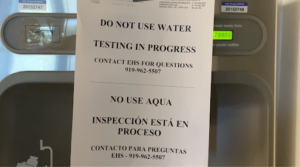UNC’s Environment, Health and Safety officials found detectable levels of lead in water fountains and sinks in eight buildings around campus. Reporter Taylin Cain talked to concerned students and showed us how to perform an at-home water contamination test.
Fordham, Hamilton, Manning, and Phillips halls are among the eight campus buildings where university officials found detectable levels of lead.
There are 21 water fountains and 14 sinks between all the buildings that people on campus should refrain from using. Those contaminated fixtures have since been removed, and building occupants were notified. But there are still many concerns around campus.
“My initial reaction to the lead in the water was like, wow, I didn’t expect it from a university like chapel hill,” UNC student Ashton Hutchinson said. “And it can impact students mentally, physically and financially.”
Another UNC student, Lynetta Wan, said all students drink water from campus every day. “So if there is a problem with the water, there must be something related to student health.”
Reporter Taylin Cain purchased an at-home lead testing kit. She performed a water test in a vacant Phillips hall bathroom where reports from the EHS showed approximately 26.3 parts per billion of lead in the water fountains.
To test lead levels in the water, first, use the dropper to place two droplets of water sample into the test vial. Swirl it gently for a few seconds. Then, place the lead test strip into the test vial with the arrows pointing down and allow it to sit for ten minutes.

After waiting for ten minutes, as the instruction prompted, fortunately, the vial did test negative. Carolina Week concluded that there is no lead in the Phillips hall women’s bathroom on the second floor. Anyone concerned can test the water on their own by purchasing at-home lead testing kits at home improvement or department stores like Lowe’s or Walmart.
In an emailed statement to Carolina Week, the orange county water and sewer authority said they are supporting UNC’s efforts to sample water fountains and sinks on campus. And that they “want to assure the community that this does not mean that lead is present in the drinking water across the service area.”
Anyone concerned about possible lead contamination can contact campus health at 919-966-2281 or their primary care providers.
